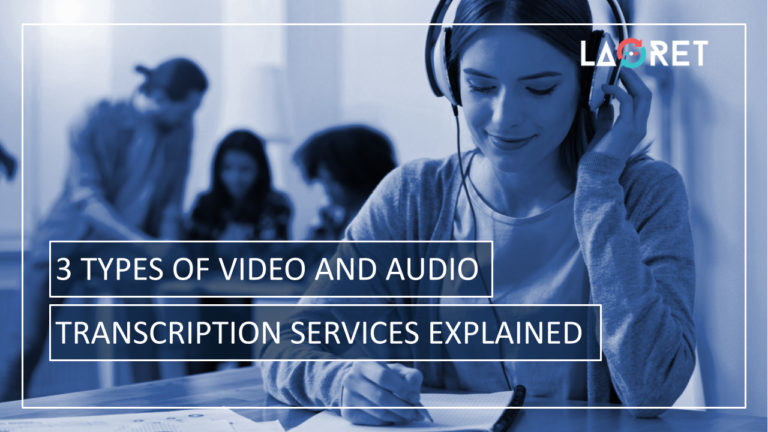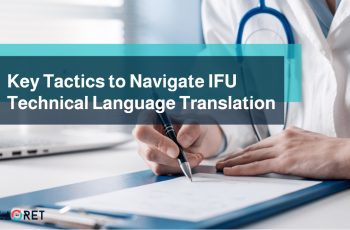3 Types Of Video And Audio Transcription Services Explained
Transcription Services can be an indispensable service if you need your audio or video file in a written form in order to properly analyze and use the content. Of course, there are different types of transcription services, and before you look for any specific service provider or tool, you will want to know which type will suit your needs best.
In this blog, we give you a detailed overview! Also? We added some extra tips on how much transcription services cost and how you can spot quality transcription services!
What Is Transcription?
Transcription transforms the spoken language in an audio or video file into a written script, to either use as such or make it ready for translation. Transcription services can be a vital part of qualitative research and data collection. If meetings, conferences, and discussions are held, a written document is often needed for analysis.
Transcription can be a time-consuming process and should not be underestimated. There are specific types of transcription that would suit certain industries and content types best, as well as specific guidelines that should be followed when determining how you can choose reliable transcription services for your specific needs. Let’s dive in!
What Are The Types Of Transcription Services?
There are different types of transcription services available, and understanding what each one of them entails helps you make an informed decision. Let’s dig more deeply into Verbatim Transcription, Edited Transcription, and Intelligent Transcription.
Verbatim Transcription
A verbatim transcript captures every single spoken word including mumbled words, interjections, stammers, and language errors in the recording, and puts it into text. This type of transcription is intended to be 100% faithful and complete, which means that any colloquial language, stutters, and repetitions, and interjections such as uhm are retained.
The word-for-word transcription is particularly useful in situations where full accuracy is required, and every word counts, and so this type of transcription should be used for:
- Academic Transcription: academic lectures, projects, lessons, or any other recorded school and research related materials.
- Legal Transcription. Legal content needs to be fully accurate in order to ensure complete comprehension. A legal transcriptionist will provide a faithful and accurate transcription of an audio recording of a deposition, trial, or any other legal event.
- Medical Transcription: Medical content too will need to be accurate to ensure that there are no medical or even legal complications as a result of misinterpretations. This includes any audio recorded materials dictated by healthcare professions, such as medical reports, lectures, and so on.
- Market Research Transcription: market research is essential for understanding a client’s business expansion, and any market research that is gathered in audio or video form should be transcribed to create reports, for instance. While some market research could also be filed under the next category of Edited Transcription, it will depend on the type of research and if local languages and expressions are useful to the research.
- Any type of qualitative research in the scientific field where every detail matters.
- Captioning for videos on social media that might be watched in silent mode.
Edited Transcription
An edited transcription, also referred to as a clean transcription, doesn’t preserve every little word and sound, but rather aims to maintain the core intent of the content, while cleaning up the interjection, repetitions, and grammatically incorrect phrases or sentences.
Edited Transcription is generally used in:
Intelligent Transcription
Intelligent Transcription omits all mumbled words, interjections, stammers, language errors and pauses throughout the conversation. At that point, Intelligent Transcription might sound similar to Edited Transcription. What makes all the difference, however, is that, in Intelligent Transcription, the transcriber performs light editing to correct sentences and grammar and eliminates irrelevant words or sentences.
That is why this type of editing will be suitable for:

How Do Languages Services Provide Price Transcription Services?
This service will be required if you don’t have the original scripts of your source recorded files available. Transcription is usually charged per minute, and while the outcome may vary, you can expect an estimated average of 70 “ 140 words per minute. If the audio or video file is longer, the service could be charged per hour.
There are certain situations when the price tag on your transcription services can go up. For example, the use of timestamps, the type of tone, pauses, and audio quality could influence the price. So, make sure you inquire what is included in the price to avoid any unpleasant surprises.
To keep costs down, try to implement the following tips:
- If you know the audio file will eventually be transcribed, try to use clear language free of colloquialisms.
- Keep background noise to a minimum and record in a soundproof booth or the quietest room in the house or building.
- If you know you stutter a lot or might use a lot of interjections, consider following a script.
- Of course, you can’t script every situation, and interviews or debates, for example, can very easily take on a life of its own. In this case, try to enlist the help of a gifted moderator to head the debate who could possibly impose some rules, such as keeping interruptions to a minimum.
- If you are recording a phone call, make sure that a headset is used to avoid the line picking up any peripheral noise.
- Always perform a sound check before you begin recording
How To Choose Reliable Transcription Services?
Understanding the types of transcription services is one thing, but with so many options out there, how do you choose the best transcription service out there? Let’s break them down.
Automated Transcription
If you have a high-quality audio file or a simple piece of video with no background noises, you may consider automated transcription. If the audio is clear and the speaker speaks slowly without a strong accent, audio-to-text converters may work well for you as a cheap and fast option. That being said, you will still need to put in some time revising and proofreading the output in order to assure the best overall quality.
Manual Transcription
Of course, very few audio and video files have a perfect sound quality. There could be background noises, several speakers caught in a heated debate using heavy accents, or irregularities in volume. In this case, manual transcription is a far better idea. It is true that manual transcription can be time consuming, so it is important to identify transcription software you want to use and to incorporate them in a streamlined workflow.
Professional Transcription Services: The Quality – Speed Sweet Spot
But what if you don’t have the time or resources to perform manual transcription? Then you will benefit most from professional services. A professional transcription company will already have all the necessary tools and experts at hand and will know what to do even with corrupted audio files and will have optimized their workflow to meet any challenges. On top of that, they will be able to deliver scannable, time-coded files ready for use.
If you are dealing with foreign languages, or if your transcription is part of a larger multimedia localization project and you will also be needing multilingual voice-over and subtitles, you will need the help of a language services provider. You could have your script transcribed before sending it along to your selected vendor. However, we recommend that you allow the vendor to be part of the process from the start. Not only can they provide you with professional transcription services, but they can also keep the entire project within the same team who will work within a streamlined workflow to ensure quality, fast turnarounds, and cost-effective solutions. Note that while with an LSP, a transcription is often the first step in subtitling, voice-over and dubbing services, but is also offered as a stand-alone service.
Lastly, note that some transcription content will be sensitive, especially in the case of the legal or medical industries. When working with a Transcription Company or an LSP, make sure to ensure that your data is protected through end-to-end encryption and NDA agreements and your content is protected!
Conclusion
When determining the transcription service you need, make sure that you assess your needs and understand what each type involves. Beyond the transcription type, it is vital to understand which service would work for you. Don’t simply go for the cheap and easy option of automated tools. Look at your content and files, and determine what you want to achieve, especially in terms of quality.
At Laoret, we offer stand-alone transcription services and multimedia localization services from A to Z. We rely on in-country, native professionals only, and have streamlined our workflow with optimized tools. Our end-to-end encryption and NDA agreements ensure the safety of your content. Try us out! We remain available 24/7.






